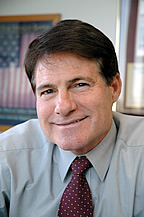Communications Chair Follows Election
Says No New Trends in Political Coverage
February 4, 2008
by Pamela McLaren
Tony Fellow, chair and professor of communications at Cal State Fullerton, has been an avid follower of politics and elections, covering elections as a student and later as a working journalist. He also regularly teaches a graduate course on politics and the media.
Last month, Inside Online asked Fellow for his views on the upcoming election and how the media is covering the action.
“This is one of the most exciting presidential elections in years,” said Fellow. “No incumbent vice president is running and we also have a plethora of candidates of varying backgrounds, a true representation of the American spirit. Making it even more exciting is that the races in both parties are wide open.
While recently in China, Fellow listened to CNN’s coverage. “Their political teams kept repeating how they were going to do things differently. It was not going to be horserace journalism this political season.
“That type of journalism is generated by what the polls say and who has the most money in the bank. With that type of coverage, we can forget about who knows the issues and any second-tier candidate who might just be a better choice to lead America.”
Despite their proclamations, however, Fellow says that CNN and other news media did fall into the pattern of who’s first in the polls with how much money. The result, he feels “leaves much to be desired.
“If I were to grade CNN’s coverage of the primaries I viewed, I would give them a D. I would even go further and say their coverage has been biased.”
A trend Fellow sees is many voters “are bypassing the media and participating in online conversations and blogs. I find myself spending too much time reading as much news about the elections online, and this year I find I must comment on stories in the Washington Post and Politico. And the press is giving us that opportunity.
“However, when you get on these blogs, you soon realize the candidates’ spin doctors have beaten you to it. The challenge for journalists — and voters — is to decide what is truth and what is spin.
“A greater challenge for journalists is to do their job, present us a picture of what this person will be like as president. Tell us about their past record. Have they abstained on important issues? Are they a product of the media? And what about those candidates who aren't front-runners but have important points to make?
“Voters, particularly young voters, have a challenge to get through the spin and fancy rhetoric and media sound bites and look at what these candidates bring to the table in experience and vision. And they need to forget about which celebrity is supporting which candidate.”

